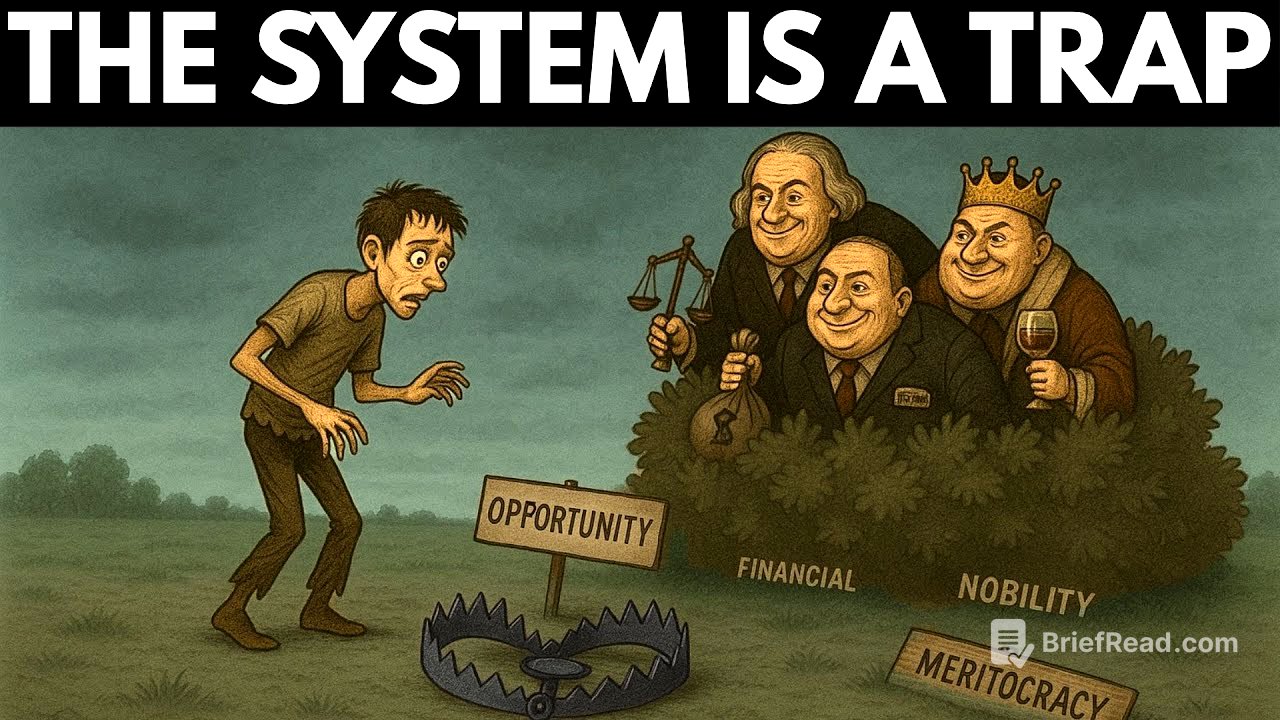TLDR;
The video explores the paradox of modern progress, which, despite advancements, has led to a fractured human spirit, characterized by exhaustion, a lack of meaning, and a sense of disconnection. It argues that modernity's focus on external improvements has neglected the internal world, leading to a transactional existence, fragmented attention, and a loss of essence. The video suggests reclaiming authenticity, presence, and genuine connection as acts of resistance against a system that prioritizes productivity and consumption over well-being.
- Modern progress has led to a fractured human spirit despite technological and material advancements.
- Modernity's focus on external improvements has neglected the internal world.
- The modern world encourages a transactional existence, fragmented attention, and a loss of essence.
- Reclaiming authenticity, presence, and genuine connection are acts of resistance.
- The system prioritizes productivity and consumption over well-being.
The Collapsed Promise of Progress [0:00]
The traditional idea of progress as a secular gospel, promising a brighter future through inventions, economic milestones, and scientific breakthroughs, has quietly collapsed. Despite unprecedented technological development, global connectivity, and material abundance, the human spirit feels increasingly fractured. People experience exhaustion and struggle to find meaning in life, suggesting that progress has failed to fulfill its promise. Modernity has overlooked the interior world, mistaking convenience for contentment and assuming that eliminating obstacles would naturally lead to joy. The absence of friction has diminished opportunities for depth, breeding apathy instead of peace.
The Paradox of Modern Life [2:18]
Modern life has expanded outward but hollowed inward, leading to a paradox where connection is abundant yet communion is scarce. People are more informed but less anchored in wisdom, living in cities that never sleep while their hearts rarely rest. Systems designed to enhance life have obscured it, chaining individuals to endless cycles of motion and fragmenting attention. The modern individual exists in a contradictory state, powerful in tools but fragile in spirit, having gained efficiency but lost essence. Ritual has been replaced with routine, reflection with reaction, and silence with noise.
The Acceleration of Modernity [4:28]
A quiet tension arises early in life, driven by expectations and comparisons, pushing individuals to move forward without a clear personal direction. From the beginning, every moment is preparation for the next, with school preparing for university and university preparing for the market, yet the purpose fades. Living becomes a form of deferral, a waiting room for a version of life that remains out of reach, fragmenting time into progress and deadlines. The system normalizes exhaustion and medicalizes anxiety, drowning out inner silence with notifications and targets, rewarding compliance with just enough comfort to mask the cost.
The Illusion of Connection [6:31]
Despite mastering the mechanics of communication, the ability to truly connect has been lost. Technology, while promising to eliminate distance, has replaced it with noise, turning constant presence into constant interruption. In the age of hyperconnection, silence and intimacy are rare, conversations are shortened, and attention is divided. Availability is mistaken for closeness, leading to more speaking but less listening, more sharing but less revealing. The screen becomes a mirror for curation rather than confession, shaping identities for validation instead of truth, and measuring worth by digital feedback.
The Loss of Reflection [8:37]
In an age of readily available information, thinking is declining as people endlessly consume content out of restlessness rather than curiosity. Knowledge is reframed as stimulation, a way to stay occupied, creating the illusion of understanding without grounding or anchoring. Reflection requires time, which has become scarce due to constant notifications and opinions. Even moments of contemplation are interrupted by the temptation to know more, causing knowledge to lose its weight and become superficial. The space for ideas to transform individuals slowly in silence is lost.
The Metrics of Worth [10:22]
Modernity has redefined success as visible, quantifiable, and external, measured in numbers, income, reach, and recognition, shifting away from virtue-based metrics. Human value has become entangled with productivity, with worth determined by usefulness, output, and contribution to the machine. This logic penetrates deeply, influencing conversations, creating guilt during rest, and fostering apologies for not being busy enough. Individuals judge themselves by these standards, internalizing the script that equates production with value and visibility with relevance.
The Trap of Consumption [12:30]
Modern life depends on perpetual wanting, with consumption becoming an identity and a logic through which the self is expressed. People are encouraged to see their purchases as reflections of who they are or should be, turning products into signals of taste, belonging, and success. This system manufactures desire through comparison and suggestion, ensuring that satisfaction is fleeting and the cycle of consumption continues. Discomfort is soothed with consumption, shaping perceptions of fulfillment and leading individuals to constantly seek what they need next instead of addressing their emptiness.
The Disappearance of Time [14:24]
One of the most subtle losses in modern life is the experience of time, not just as measured units, but as presence. Surrounded by clocks and schedules, the present moment has become a corridor to something else, delaying joy and postponing meaning to a future that often resembles the ignored present. The structure of modern life rarely permits stillness, and when it does, individuals struggle to cope with silence and boredom, filling the space with distractions. This results in a quiet disorientation, a sense that life is passing by even as one stays busy.
The Illusion of Independence [15:49]
Modernity has elevated the individual as a self-contained unit, making independence a virtue and self-sufficiency a moral imperative. Needing others is seen as a flaw, leading people to navigate life without help and present strength even when feeling hollow. However, this performance of autonomy has caused something human to wither, as connection is a basic condition of being alive. Idealizing independence normalizes isolation, building lives where no one sees behind the curtain and where loneliness hides in busy schedules.
The Silence Within [17:38]
Amid the noise of modern life, the most devastating silence is the one within, as constant invitations to look outward cause individuals to stop asking who they are beneath it all. This disconnection unfolds through compromises and distractions, dimming intuition and blurring desire, leading to a life driven by momentum rather than intention. The absence of self becomes noticeable in quiet moments, creating a sense that life is being lived but not by you. Without a connection to the self, even success feels hollow and love feels unstable.
The System's Design [19:30]
The discomfort felt in modern life may stem from a system not designed for human well-being, where efficiency and scale are prioritized over wisdom and depth. Institutions reward performance over presence, markets extract more than they nourish, and cultures celebrate visibility over authenticity. People become functions, utilized and optimized, leading to existential erosion and a sense that something essential is being lost. The system thrives on movement and discourages pausing to question its purpose, normalizing distraction and pathologizing doubt.
Returning to Authenticity [21:27]
When the illusions of success and progress fall away, what remains is a quiet space where something real can begin: a return to the self before roles, to the voice beneath the noise, and to the presence that needs no validation. Reconnection comes in fragments, in small acts of honesty and choices made without an audience, living by values that no longer need explanation. Authenticity is a risk, potentially leading to misunderstanding and solitude, but it is also the beginning of peace, growing when one is no longer at war with oneself.









